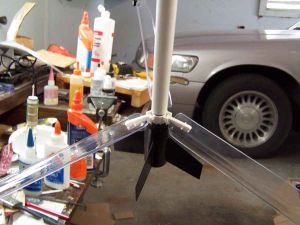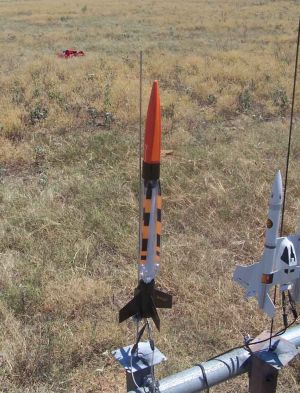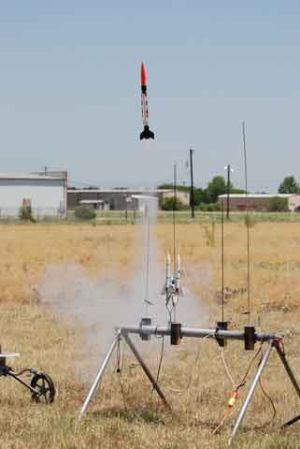| Construction Rating: | starstarstarstarstar_border |
| Flight Rating: | starstarstarstarstar_border |
| Overall Rating: | starstarstarstarstar_border |
| Manufacturer: | Estes  |

Brief:
I'm going to be taking part in a rocket exhibition for some elementary aged kids next month and wanted to show a wide variety of types. In thinking about it, I realized that I have not built a true helicopter recovery model before. I began to look around to see if I had a really simple one and I found the Estes SkyWinder which seemed to fit the bill.
Construction:
The first step in construction is to locate the two halves of the plastic fin can. I found them and test fit them. They seemed to fit together fine but I did find some plastic flash I wanted to clear off using a razor knife. I then put the halves together using Plastuct instead of the tube type cement recommended.
Next up was the lower launch lug. It was found on a sprue which ostensibly contained the upper lug as well but the instructions said to discard the upper part since on this rocket the upper lug is molded into a different part. The lug was placed with Plastruct as well.
After the lug came the fins. There are four plastic fins to be attached. I test fit them and found 2 to be perfect fits and 2 to need a little trimming. The fins were then bonded into place with Plastruct.
The shoulder for the lower rotor hub was then located as was a cardboard centering ring that needed to be inserted within it. I sanded around the ring to smooth it up a bit and test fit it. That's when I noticed that there is a directional key slot. It will fit correctly only in the right orientation. For this step, the ring was bonded with Testor's tube style cement. The shoulder also required the insertion of a blue BT-5 sized insert. I assume that the cardboard hold up to the ejection charge better than the plastic but that's just a guess. It too was placed with the tube cement, and as per the instructions, every effort was made to clean up any excess at the end. With that, the aft shoulder was slid into place on the fin can. It is keyed so that it can fit only in the correct orientation. It was bonded into place with more Plastruct.
 The rotor hub was easy to locate and identify because it is a white plastic piece in the midst of mostly black plastic. It was placed on the shoulder and checked to make sure it rotated freely. It did without any problem. The cap to hold it in place was then located. Its a short piece of red coupler tubing for BT-5. I test fit that and found there was no problem there either. The coupler was then pulled back off and given a dose of tube cement and then replaced, making sure that it did not interfere with the rotor.
The rotor hub was easy to locate and identify because it is a white plastic piece in the midst of mostly black plastic. It was placed on the shoulder and checked to make sure it rotated freely. It did without any problem. The cap to hold it in place was then located. Its a short piece of red coupler tubing for BT-5. I test fit that and found there was no problem there either. The coupler was then pulled back off and given a dose of tube cement and then replaced, making sure that it did not interfere with the rotor.
The rotor hinges were the other bits of white plastic. They were located and, after careful examination of the illustrations in the instruction to ensure proper orientation, were snapped into place. They did not travel as freely as I expected but I suspect that the range of movement is adequate.
The actual body tube for this rocket is a white section of BT-5. It was located along with a plastic stop meant to fit into one end. As per instructions, the stop was installed with tube cement.
The upper slide is another plastic black component. It was located along with a black cardboard ring meant to be installed around the tongs of the slide to prevent them from opening too much. The ring was bonded with more of the tube cement and allowed to dry. The slide was then fit around the bottom of the BT and slid up into place.
With the upper body assembled and put onto the BT, the BT then had to be placed onto the red coupler just above the hub. The fit was too tight and the cement joint between the plastic and paper coupler sheared almost immediately. I did some sanding on the coupler and then reseated the BT using some thick CA as the adhesive this time. I also made sure not to get any onto the rotor.
The kit comes with four "butter pats" of clay to be used as a nose weight. From what I have read on The Rocketry Forum, that makes this rocket particularly heavy on prone to damage on landing. I've also read that failure to use it can lead to very unstable flights. The instruction method is to roll the clay into snakes and tamp it into the nose cone. I did not want to do that. Instead, I measured out an equivalent weight in BBs and poured those into the plastic nose cone. I then mixed some 15 minute epoxy and poured that in on top to keep it all in place.
Attachment of the rotors is probably the most difficult aspect of the build, but it is not particularly difficult. The rotors are clear plastic and have slots that fit over a protrusion on the hinges. The only real issue is trying to identify the correct orientation since the illustrations are not very clear. A little thought and the text pointing out that that rotors form a "tube" around the BT gave only one possible option, even though the result does not look much like a tube to me.
Finishing:
For the most part, this rocket is pre-finished. All the parts are colored and there are some stickers with which to decorate it. I chose to do some minimal painting though. The plastic nose cone had some pretty bad seams on it. I sanded them down but that left the black plastic looking awful. I decided to paint the NC. So it was that I sanded it a little more and then shot it with white primer. It got 2 coats of the primer.
After the primer, I decided to go with an orange nose cone instead of black and sprayed on 2 coats of Testor's Competition Orange. I happened to have it sitting out for another project it so grated on me less than most oranges do. I actually liked the result.
Since the nose cone would look pretty silly sitting on the bench while the rest of the rocket went flying, I used some tube cement to bond it into the upper slide. That just left the motor retainer to put into place before I could finish "finishing" my rocket with the stickers.
I detest stickers. I would much rather have waterslide decals and sometimes scan stickers to print my own waterslides. I would not do that with a kit like this so I was pleasantly surprised when I actually took a close look at the stickers. Most of the time, stickers are thick things that do not want to follow a curve too well. These were not. They are fairly thin, not much thicker than waterslides. I learned that they stick better than most stickers also.
The first to be applied were the stripe pattern on the rotor blades. Once in place, they greatly improved the look of the rocket and made the blades much more visible to boot.
One thing I did not consider when painting the NC orange was the placement of a bar pattern sticker on the cone. The oranges did not match up and the pattern would have been much more visible on the black, but it's not completely terrible.
Another group of stickers intended for the NC was a series of three long, orange triangles the length of the NC. I used only two of them and they did not show up all that well (although better than in the photo).
One of my common pet peeves with Estes is their inability to count compounded by their unwillingness to often provide enough stickers/decals for both sides of the fins. In this kit, they were guilty of both. In a perfect world, there would have been 8 stickers; this would handle both sides of 4 fins. In actuality, it came with three so that three fins have a single sticker and one is staying "nekkid".
Placement of the fin stickers completed my build but I wanted to try something first and make sure that the rotors would deploy. As such, I added the rubber bands, folded them against the BT, and set the slide in place to retain them. I pulled up the NC and the rotors deployed. I then got stupid and tried to fumble with the camera while manipulating the NC, fins and rotors and wound up with this short sequence.
Personally, I would not classify this kit as being an E2X. It is easy but it does take a little bit of building. Level 1 should be about right.
Construction Rating: 4 out of 5
Flight and Recovery:
For the first flight I chose the B4-2, the recommended motor. I did this even though many on TRF said it was underpowered. They were right.
It took off and arced over. I was very thankful for just having a 2-second delay when I saw the blades pop out. The rotation was fine and, except for landing nose first in a fresh cow patty, it was fine.
A video of the first flight can be seen here.
For the second flight, I used a C6-3. This time everything went right and I had my first real heli-recovery rocket operational. A video can be seen here.


Flight Rating: 4 out of 5
Summary:
This rocket is not a bad introduction to helicopter recovery. From what I understand, it is a piece of cake compared to other copters. Its probably not the most durable choice but its something just about anyone can build.
Don't pick a B4 motor!
Persons interested in following the development of this rocket in photos and vids are invited to check here.
Overall Rating: 4 out of 5
Other Reviews
- Estes Skywinder By Jeff Gilmer
This is an easy to build helicopter recovery rocket. Kit contains one body tube, two nose pieces and a dozen or so motor/rotor pieces The overall instructions are classic Estes. They start with a complete parts list move logically into a step by step description with illustrations. The beauty of this kit is the ease of building. Except for a couple of issues this kit can be completed ...
- Estes Skywinder By Spinal
(Reprinted with permission from Spinal's Fun & Hobbies Page) ---------------------------------------------------------------------------- Company: Estes Price: $16.69 Series: E2X Rating: (*)(*)(*)(*)(*) Engines: B4-2, B6-2, C6-3 Nose Cone: Plastic Engine Mount: Quick Release Engine Hook (screw out kind) Fins: Plastic Recovery: ...
 |
 |
Flights
Sponsored Ads
 |
 |











